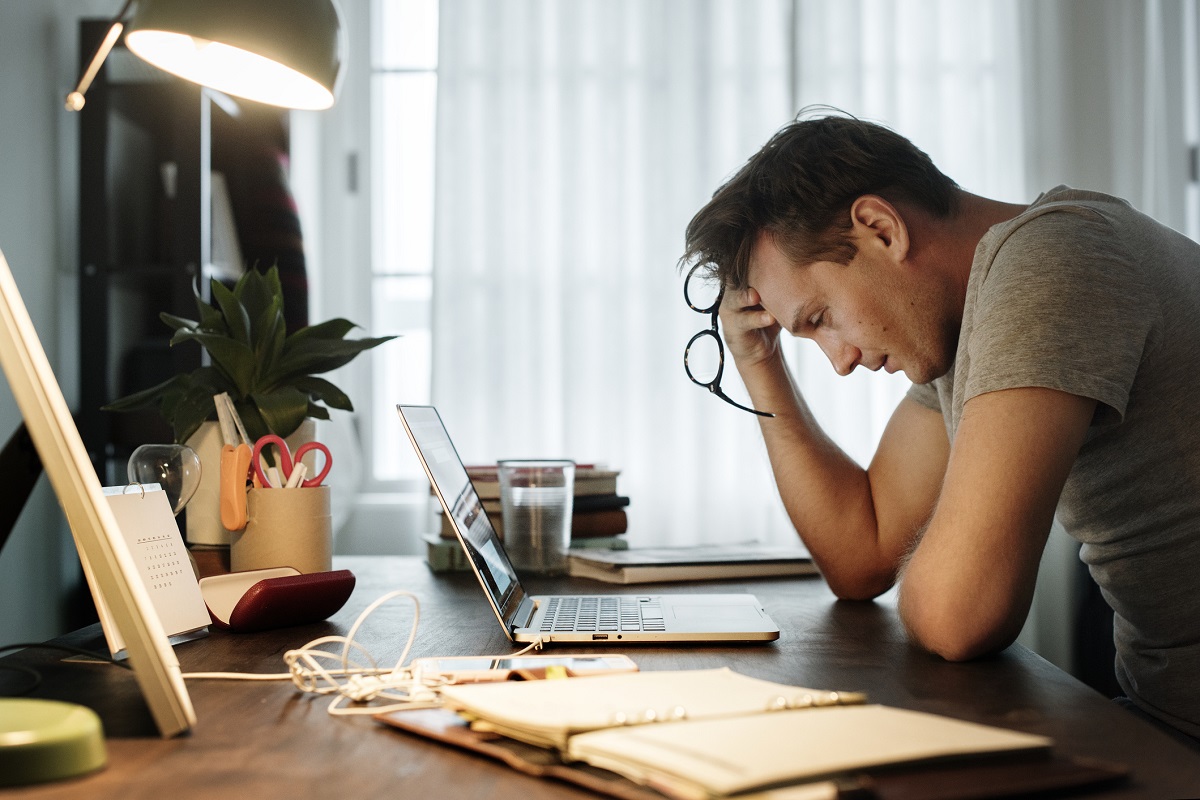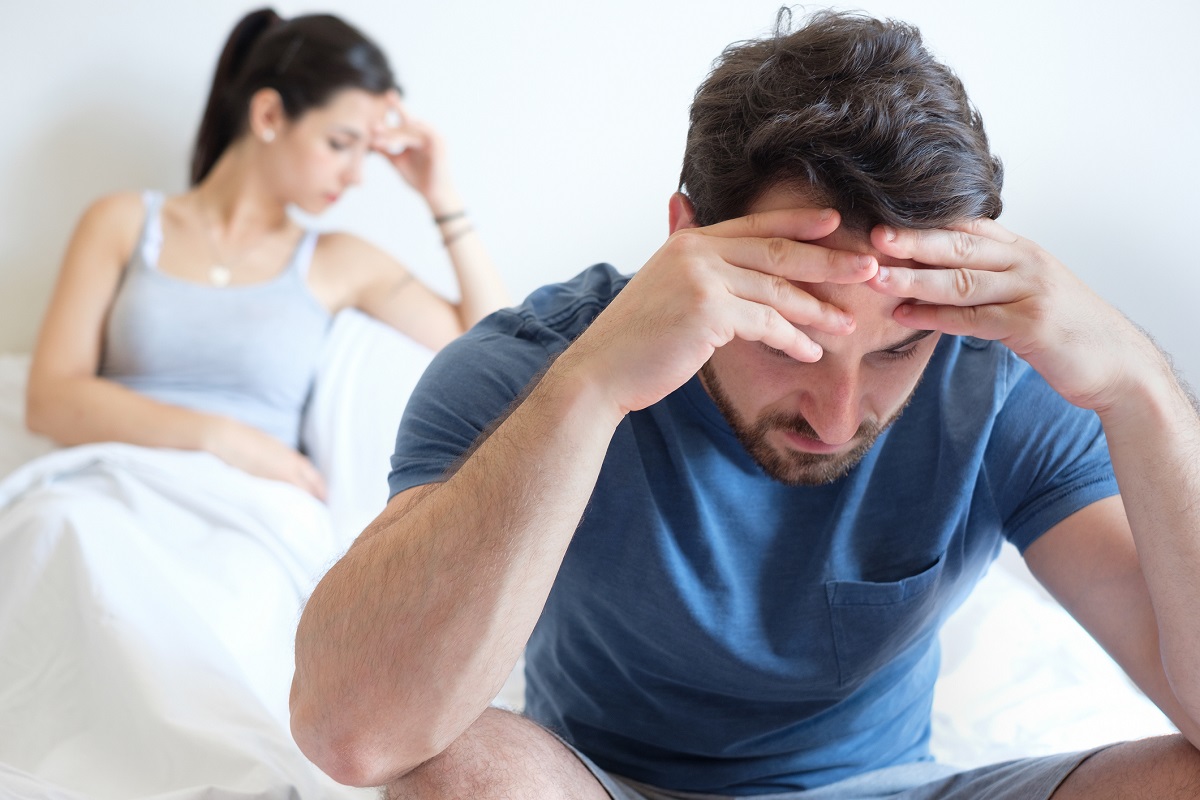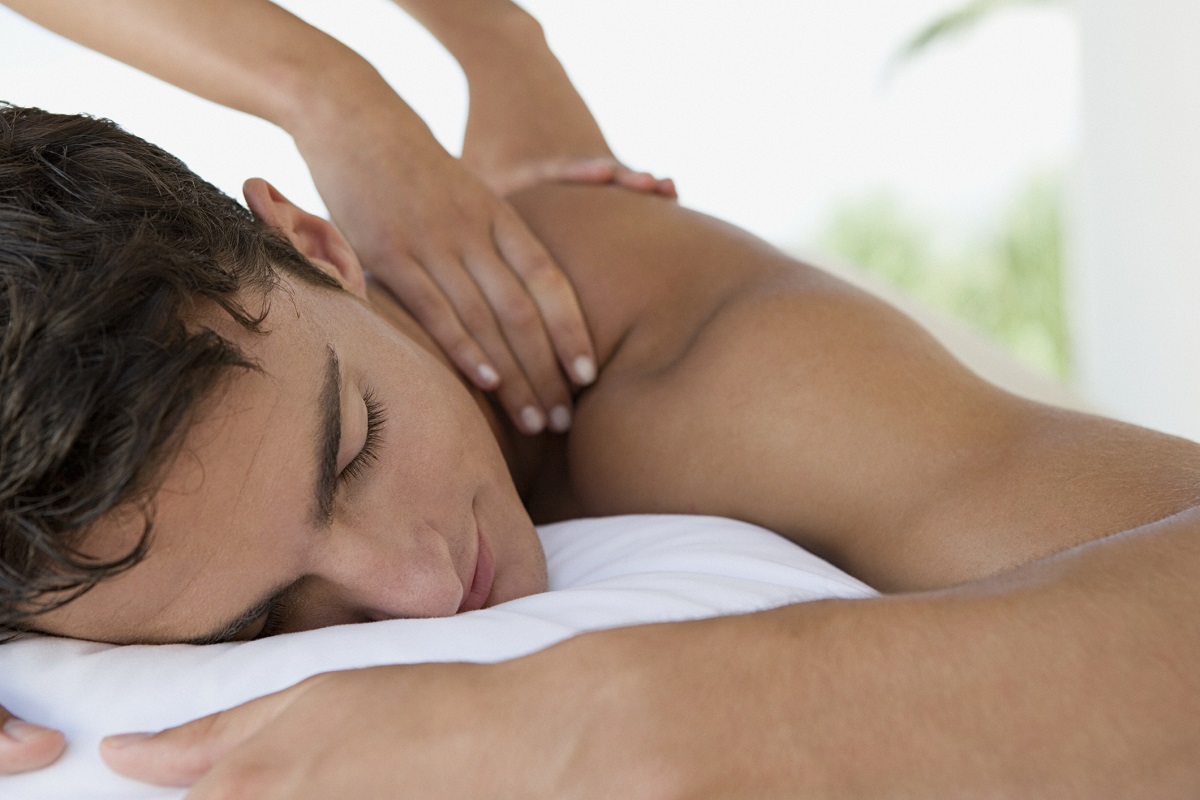- Disease signs and symptoms: differential diagnostics by Lukáš Karel, Žák Aleš, a kolektiv
- Sex education: for midwifery and nursing students: Koliba Peter, Weiss Petr, Němec Martin, Dibonová Markéta
- healthdirect.gov.au - Loss of male libido
- mayoclinic.org - Sexual health
- urology.ucsf.edu - Desreased Libido
- nature.com - Symptoms and risk factors for long COVID in non-hospitalized adults
- healthline.com -Increase Your Libido with These 10 Natural Tips
- medicalnewstoday.com - 10 ways to boost libido
- healthline.com - Low Sex Drive: Common Causes and Treatment
Libido in men: what is libido + how to increase it in men?

Today's hectic times, stress, psyche, but also various diseases and other factors can affect the appetite for sex. A long-term decline in libido disrupts the partner relationship.
Article content
Libido is sexual desire, appetite.
Libido translated means liking, sexual desire.
The level of libido changes over the course of a lifetime.
Sexual desire rises and falls over time for no apparent reason. It is normal to lose interest in sex from time to time or for your libido to not match your partner's interest.
Low libido lasting for a long time is a cause for concern, especially for men. Sometimes a decline in libido manifests itself as an indicator of another disease.
How does decreased libido manifest itself?
Symptoms of decreased desire for sex and loss of libido can manifest:
- Loss of interest in sex, disinterest in any kind of sex, in men including masturbation
- Loss of sexual fantasy and little or no thinking about sex
- Feeling dissatisfied with low desire and thoughts about sex
Breakdown of libido disorders
Let's look at how libido disorders in men are broken down.
Classification by origin and cause
Primary - arises in hormonal imbalance (in men in hypogonadism - insufficient production of hormones, in hypothyroidism, adrenal insufficiency).
Secondary - accompanies other diseases, for example, with a psychiatric diagnosis, depression or due to the influence of drugs (some drugs for the treatment of high blood pressure, psychopharmaceuticals).
Division according to combinations with other sexual disorders
Isolated - occurring alone and involving only decreased libido.
Generalized - in combination with other sexual disorders such as impaired erection, ejaculation, orgasm.
Classification by degree of desire
Reduced - sometimes occurring under the influence of drugs with psychoactive substances, in unsatisfactory marital situation, stress, psychological exhaustion.
A separate unit - can be induced by castration in a sexually deviant person.
Increased - in the life periods of a person, for example, in puberty, but also as a disorder in psychiatric illness.
In men, there is a decrease in libido in a proportion much smaller than in women.
Libido in men
With increasing age, men undergo various changes that manifest themselves in impaired function of the sexual organs.
Around the age of 45, there is a decrease in testicular function. This is manifested by a decrease in hormone production, known as male andropause, accompanied by a decline in mental and physical strength.
Loss of libido can be caused by a number of physical and psychological factors.
For example, libido can decrease due to problems in a relationship, due to stress, the birth of a child, overwork, lack of exercise, in connection with physical, mental illnesses, as well as personal and social problems.
What can cause a decrease in libido?
- Low levels of the hormone testosterone
- Anxiety, fatigue, depression
- Persistent pain
- Taking medication - antidepressants, high blood pressure medication
- Alcohol, smoking, drugs
- Health problems - diabetes, sleep apnea, cancer
- Low self-esteem, negative sexual experiences
- Unwanted sexual contact
- Trauma and post-traumatic stress disorder
- Obesity
What affects libido?
Let's take a closer look at how health problems and other factors affect libido.
Low testosterone levels
Testosterone is a male hormone that is produced in the testicles.
It is responsible for building bone mass, muscle and stimulating sperm production.
Its level affects your sex drive. A reduced level of this hormone causes a decrease in libido.
In adult men, a low testosterone hormone level is considered to be less than 300 nanograms per deciliter (ng/dl).
A decrease in testosterone occurs naturally during aging. A large decrease in testosterone causes a decrease in libido.
When testosterone levels drop, medications are given to increase it.
Read also: What is the hormone testosterone and how does it affect the male body?
The effect of drugs on libido
Some medications lower testosterone levels and this causes a decrease in libido.
These include drugs to treat high blood pressure, ACE inhibitors, beta blockers, which can cause up to erectile dysfunction and ejaculation in some men.
Medications that can cause a decrease in testosterone hormone levels:
- Some types of antidepressants
- Anabolic steroids (drugs taken by some athletes to increase muscle mass)
- Opioid painkillers such as morphine
- Cimetidine to treat heartburn and acid reflux disease
- Corticosteroids
- Hormones used to treat prostate cancer
- Antiepileptic drugs can also adversely affect sexual function
- Beta-blockers affect sex life in some cases
- Chemotherapy and radiation
Depression
Depression disrupts a person's life.
People with depression lose interest in many activities they used to enjoy, including sex.
Some antidepressants can have a side effect of reducing libido.
If you are taking antidepressants and suffer from reduced libido, tell your doctor. He or she may adjust your medication dosage or change your medication for another.
Read also: Anxiety, fear, depression or other symptoms?
Chronic illnesses
Chronic illnesses can make you feel unwell. You may experience chronic pain. This will reduce your sexual desire and drop down your list of priorities.
Chronic illnesses that can cause a decrease in libido:
- Type 2 diabetes mellitus
- Obesity
- High blood pressure
- High cholesterol
- Chronic diseases and organ failures such as heart, lung, kidney and liver
- Cancer
If you suffer from a chronic illness, try talking to your partner about different ways to keep your relationship at a healthy intimate level. Going to partner counseling or getting help from a sex therapist can help.
Read also:
- What health complications does diabetes cause? Even neglected and untreated
- How to lower cholesterol? We know 20 foods that will help get it under control
- Untreated hypertension threatens health and life. What are its complications?
Sleep problems
Men with sleep disorders or sleep deprivation often suffer from reduced testosterone levels, which causes a decrease in libido.
Sleep disorders include obstructive sleep apnea, but also sleep deprivation.
It is enough to sleep at night only 5 hours a day for a week, and already it causes a decrease in testosterone levels, even a libido disorder.
So gentlemen beware! Sleep is very important.
If you don't sleep enough at night, your testosterone levels are lower the next day.
Read also:
- What is REM, non-REM and why do we need to dream?
- Sleep hygiene: 10 simple rules for quality sleep
- 5 tips to get a good night's rest
Aging
With advancing age and old age come problems in the form of a decrease in sexual desire, longer duration to achieve arousal, problems with orgasm and ejaculation. Your erection is slower and it may take longer for the penis to gain hardness.
However, there are medications for these problems that will solve your problems.
By age 60-70, men usually maintain about the same amount of sexual interest.
Stress
If you are going through a period when more pressure is put on you, or you are going through various stress issues, your sex drive may decrease.
Stress has a very bad effect on the health of the body, and not just in the form of disrupted hormone levels.
If you have been in an accident and suffer from post-traumatic stress disorder, this can increase your risk of sexual dysfunction. So don't keep it to yourself and consult your doctor or psychologist to help you overcome the trauma.
Therefore, try to manage the stress so that it does not leave unwanted marks on your health.

Try stress management techniques such as breathing exercises, meditation, or consult a therapist to help you through a difficult and challenging time.
TIP: Meditation and relaxation techniques: what are their importance, benefits and health effects?
Low self-esteem
Low self-esteem, where a person's self-worth is lowered, takes a toll on feelings, overall well-being and especially emotional health.
If a person feels unattractive or unwanted, this is likely to affect their sexual health. They will start to refuse dates and avoid sex altogether.
Low self-esteem and self-confidence can cause feelings of anxiety with sexual performance, thus reducing the desire for sex.
Decreased self-esteem can develop over time into poor mental health, depression, anxiety. This often causes men to become addicted to harmful substances such as alcohol abuse, drug abuse. Again, abuse of these substances is directly related to decreased libido.
Movement and exercise
Lack of movement and exercise can lead to health problems affecting sexual desire and feelings of arousal.
Regular exercise and movement reduce the risk of health problems such as obesity, high blood pressure or diabetes that are related to libido.
Moderate exercise lowers cortisol levels and reduces stress, which helps increase sex drive.
However, don't overdo it with exercise. Excessive exercise, chronic intense workouts that put excessive strain on the body, are also associated with decreased libido in men due to exhaustion.
Alcohol, tobacco and drugs
Both increased and regular use of alcohol is associated with a decrease in testosterone and a decrease in sexual desire.
Smoking, use of drugs such as marijuana and addictive substances, and opiates also cause a decrease in testosterone levels. This causes a lack of sexual desire.
Smoking not only reduces libido, but also affects sperm production and movement.
Low libido and the impact on physical and emotional health
For men, reduced sexual desire is very disturbing. It leads to side effects such as the inability to achieve an erection and maintain it long enough, which causes a feeling of anxiety about sex.
Emotional tension creates pressure, relationship problems and conflicts between partners. This in turn leads to fewer sexual encounters due to feelings of anger, tension and alienation.

In a relationship, communication between partners is important to avoid tension in the relationship and subsequent conflicts from misunderstandings.
Loss of libido after covid 19
Some people whose covid-19 disease has persisted for a prolonged period of time have been found to have a decrease in libido.
Approximately 10% of persons with covid-19 disease develop various symptoms after infection during weeks 4 to 12, which may persist.
Covid-19 disease has left many people with health consequences with a wide range of symptoms that cannot be explained by a single diagnosis.
There are many symptoms ranging from persistent fatigue, sleep problems, digestive problems, hair loss, shortness of breath, pain and other symptoms to a decrease in libido that can persist for a long time after infection.
Treatment of reduced libido in men
If you have problems with reduced libido, consult your doctor.
The doctor will assess your medical condition. He or she will find out if you are suffering from a medical condition, such as diabetes or low hormone levels. Based on a detailed medical history and laboratory tests, the doctor can determine what caused your loss of libido.
In some cases, testosterone treatment will help. If there are problems in the relationship, he or she will recommend partner counselling.
Treatment is primarily aimed at eliminating the triggering cause.
If you are taking any medications that may be causing your decreased libido, your doctor may change your medication.
If you have problems with alcohol or other addictive substances, limit your use or try rehab.
If you have psychological or relationship problems, it is advisable to see a psychologist or relationship counsellor.
How can libido be increased?
Increasing your libido can be triggered by just a small change in your life.
Recommendations and lifestyle changes
- Try to lead a healthy lifestyle
- Get enough sleep
- Learn to manage stress
- Eat a healthy diet
- Get plenty of rest
- Try relaxation techniques, acupuncture, massage
Recommendations for increasing libido
If the loss of libido came without a cause, talk to your doctor about it to find out the cause.
If your low libido is due to partner disagreements, relationship problems or stress, talk to your partner about it. Talk about your feelings. Ask how your partner perceives your sex life.
Know that intercourse is just an act and sex means more.
If your desire for sex has decreased, try different ways to get aroused.
For example..:
- Improve the quality of the relationship by different activities such as planning dates, doing activities together during the day, open communication, setting aside time for each other.
- Don't forget foreplay, which increases the appetite for sex.
- Give each other more kisses, touches.
- Try exploring and caressing each other's bodies.
- Try showering or bathing together.
- Gentle and pleasant massage.
- Slow kisses on sensual areas that turn you on (e.g. thighs).
- Undress each other.
- Experimenting with sex, different sex techniques, positions, sex toys.

Increase the chances of a healthy sex life
Feeling happy with a partner, good health, holidays, relaxation and good fitness all help to increase libido.
- If you are overweight, try to lose weight.
- Eliminate alcohol, cigarette and drug use.
- Try to reduce stress in your life.
- Move regularly, exercise or go to the gym.
- Quality sleep will improve your mood and you will have more energy, which is also related to libido.
Increase your testosterone levels naturally
Testosterone can be increased not only with the help of drugs, but also in a natural way.
There are several dietary supplements, pills and injections for men on the market that increase testosterone production.
Also, proper diet and intake of certain foods promote its production.
You can read more about increasing testosterone the natural way in our article.
Natural libido enhancement
You can try to increase libido by eating fruits, spices, drinking herbal teas that act as aphrodisiacs and increase sexual pleasure.
Some herbal preparations are characterized by their effect on improving sexual function. These include:
- maca
- tribulus
- ginkgo
- ginseng
Eat aphrodisiac fruits to increase libido:
- Figs
- bananas
- avocados
Eat chocolate: not only does it taste delicious, but it can improve sexual pleasure by releasing serotonin, which can induce a better mood and aphrodisiac effects.
Add some basil or garlic to your dinner.
Natural aphrodisiacs are also:
- Chilli peppers
- cayenne pepper
- oregano
- thyme
- cinnamon
Libido stimulating also
- nutmeg
- saffron
- Cloves
- ginger
To increase libido and performance helps
- mint
- Rosemary
- vanilla
Also has a positive effect on libido:
- Onions
- garlic
- asparagus
- pineapple
- strawberries
- papaya
- pomegranate
Wine in small quantities also acts as an aphrodisiac.
Aphrodisiac herbs
Herbal teas and pills to increase libido are freely available in pharmacies.
You can have the teas blended or buy libido-boosting mixed packets directly from natural medicine stores. The leaves, roots or seeds of herbs beneficial for promoting sexual health are used.
The following table lists herbs with aphrodisiac effects
| Tribulus terrestris | Stimulates the production of testosterone and thus promotes libido. |
| Maca - Peruvian watercress | Contains minerals and substances that support sex hormones. Increases libido, improves erection and potency. |
| Saw Palmetto | Increases appetite for sex. |
| Muira puama | Improves the perception of sexual arousal and increases libido. |
| Ginseng | Helps relieve stress, insomnia, fatigue, which can increase libido. |
| Fenugreek | Supports the hormonal system, thereby increasing sexual desire. |
Interesting resources
Related










